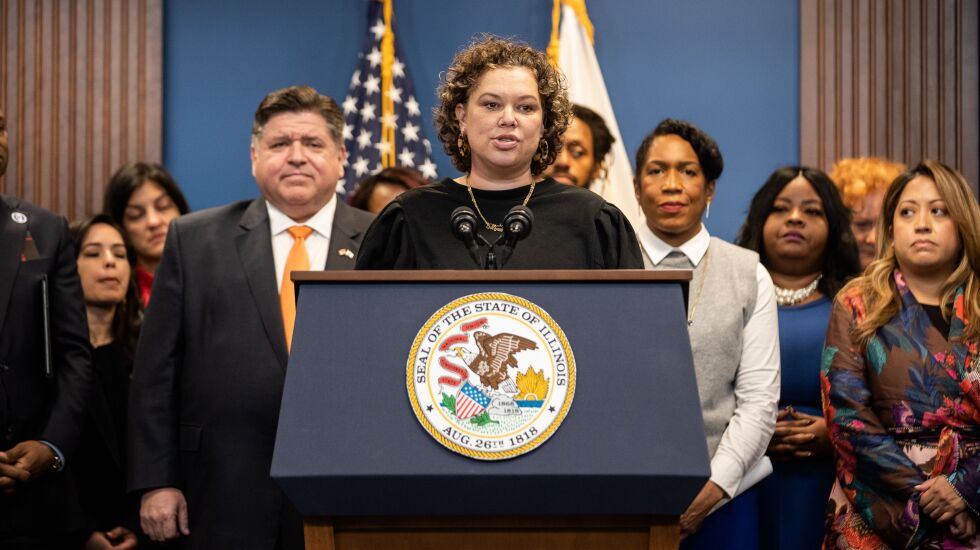
A day before Indiana’s near-total abortion ban goes into effect, Gov. J.B. Pritzker on Monday announced additional steps he’s taking to expand abortion care in Illinois — including the creation of a hotline to help patients schedule reproductive services at hospitals across the state.
A new nurse-staffed program, dubbed the Complex Abortion Regional Line for Access, is scheduled to be launched in August. The hotline, known as CARLA for short, will give patients with complex medical needs a resource to schedule appointments within Illinois hospital systems, acquire required pre-operative testing, and arrange for payment, transportation and child care.
That hotline will be run by the Illinois Department of Health and Family Services, the Illinois Department of Public Health, the University of Illinois at Chicago, Rush University System for Health and the Chicago Abortion Fund.
The governor’s office also announced a request for proposals for a separate abortion service navigation hotline to help patients find abortion care in Illinois, including those traveling from states in which abortions are banned, with funding coming from the Health and Family Services Department’s budget and Medicaid dollars.
“In the 13 months since the Supreme Court made the retrograde and disruptive decision to overturn Roe v. Wade, 14 states have outright banned abortions, stripping Americans of their rights to privacy, bodily autonomy and freedom,” Pritzker said at a news conference at the University of Illinois Chicago.
“But in the Land of Lincoln, we’ve doubled down on our commitment to maintain and expand reproductive health access for patients and protect providers.”
Since Roe v. Wade has been overturned, Pritzker and the Democrat-led Illinois General Assembly have further expanded abortion rights in Illinois — seeking to create a safe haven for patients traveling from states that have banned abortions.

A measure signed in January protects out-of-state patients who are seeking abortions from legal action. Another that will prohibit the use of license plate readers for tracking those entering the states for abortions is awaiting Pritzker’s signature. The Illinois Department of Public Health this year also announced it would not be reporting abortion statistics for Illinois counties to protect patient privacy and safety.
Another expansion announced on Monday creates a family planning program for people who are otherwise not eligible based on a Medicaid income threshold.
The plan would raise the income eligibility for the regular Medicaid program to include services such as an annual exam, family planning counseling, FDA-approved methods of contraception, permanent methods of birth control and basic infertility counseling. Cervical cancer screenings, mammograms, abortion care and transportation for family planning visits would also be included in the program.
And to help support Illinois health care providers that are experiencing increased demand for their services, a $5 million in grants will be available through the state’s capital program Rebuild Illinois. That funding will also help pay for more mobile abortion care units.
Megan Jeyifo, the executive director of the Chicago Abortion Fund, said her organization helps up to 300 people a week access reproductive care and has received more than 10,000 calls in the wake of the Supreme Court’s decision to overturn Roe v. Wade. Her organization saw an increase from 26 hospital-based patients in 2021 to 250 in 2022, with many of those patients coming from 19 states where abortions are banned.
Jeyifo said the nurse-staffed hotline program CARLA will strengthen the working relationships with four major Chicago hospitals and make sure that callers can get access to care as soon as possible.

“And most importantly, it will strengthen Illinois’ ability to do what we have already been doing in this landscape, stepping up as a national access point for hospital-based care,” Jeyifo said.
Abortions are banned in neighboring Wisconsin and Missouri. An Iowa district judge on July 17 temporarily blocked a ban on abortions after about six weeks.
Indiana was among the first in the nation to pass an abortion ban last year after the Supreme Court overturned Roe v. Wade. But the law had been blocked due to a legal challenge.
Beginning Tuesday, abortions will be banned in Indiana except in cases of rape or incest — as long as the procedure is not done after 10 weeks. The new law allows abortions up to 20 weeks to protect the life of the mother or if the fetus is diagnosed with a lethal anomaly.
It also takes away the licenses of all seven abortion clinics in the state and requires abortions to be done in certain hospitals. Doctors who perform illegal abortions would face up to $10,000 in fines and face six years in prison.







